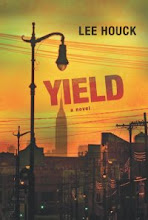Part Two: Diligence
When I moved to New York in 1998, I was a theater person. I had spent the previous four years under the tutelage of an extraordinary teacher and theater professional, and spent the summer after graduation working on yet another show with the same people I'd been working with for years. We had a captive audience--the school was required to attend the productions as part of the curriculum. We could do whatever we wanted, and we did. We did productions by the San Francisco Mime Troupe. We did Peter Weiss's Holocaust play. We did Brecht and Beckett. We did the Neo-Futurists. This was in a high school in Tennessee, mind you. My brother is famous for claiming that all our shows had basically three elements: 1) Writhing, 2) Sirens and 3) Guns'N'Roses. (I sort of resented it then, but he might have been right.) Other people in school called us "Theater Jerks."
The first thing I did when I came to New York was jump into a show with the folks who had made the migration with me--there were four of us living in the same apartment, plus a few more living in Brooklyn. We did a toy-theater version of Vonnegut's "Sirens of Titan," at Los Kabayitos Puppet Theater, on the Lower East Side. And at this point, I started writing monologues and scenes for two people. Some of them were monologues in my mind, but clearly would make no sense in front of an audience. It felt like an extension of the same work--I'd write these things and at some point we would perform them.
But that didn't happen. Theater in New York is very, very different. Bless our hearts for thinking that we'd put something up and then people would come to see it--easy as that, right? We tried to do a few other things--things with scripts, things without scripts, things where the script was supposed to emerge from the work. (Ha!) Then things shifted--one of us moved to Vermont, essentially. One of us became more and more busy with schoolwork. And I found myself, night after night, wondering what I was going to do with all this creative energy that was zapping its way through my body.
Then I wrote a paragraph in a very clear, very concise voice and after a few days of reading and re-reading it, I decided that I would keep writing and see where the voice wanted to go. Two years later, I had a first draft of a novel. Two years after that, I had maybe a 10th draft. Then in 2005, I finally finished it--counting verbs, posting the pages all over the new apartment. (I was now living alone.) Then, two years after that I sent the novel off to a contest, and it won the dang contest. Then three months after that the phone rang. It was my agent--someone wanted to buy novel that I made from the echoes of that first paragraph. And that novel will be out there for you to read about a year from now.
This end point--the waiting until the book is a thing outside of you--is not the point where you become a writer. All of the above is how you become a writer. You were a writer the whole time. This picture is the stack of manuscripts going back the last five years. The five years before this have already been recycled. So, when Jane asks: "What can you tell me about your twisted paths to becoming a writer?" I think this is a long, rambling way of saying: Diligence.




2 comments:
You have been a writer since you were able to hold a pencil and form letters--well, actually, since you were able to speak. The physical writing was a natural follow-up to your storytelling. Remember the horse you trapped in our backyard and the miscarriage I had (not) that created drama in the first grade?
While I certainly had my opionions regarding your theatre experience, I don't think anyone can argue the postive nature of the result.
Post a Comment